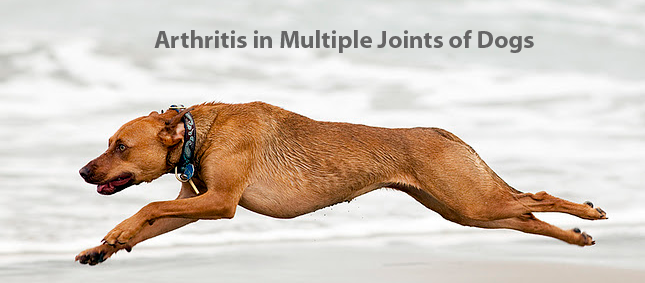Arthritis In Multiple Joints Of Dogs
Arthritis is a common ailment in dogs that can affect one or more joints. Any dog is at risk for arthritis, especially senior dogs and large breed dogs. Dogs that are overweight, no matter what their breed is, are also at an increased risk for getting arthritis in several joints due to the excess weight that is put on them.
The most common form of arthritis that affects multiple joints in dogs is osteoarthritis or degenerative joint disease. Degenerative joint disease is the breakdown of the cartilage around the joints caused by normal wear and tear, trauma, obesity, previous joint disease, or birth defects.
Dogs that are suffering from degenerative joint disease usually show signs of stiffness in the affected joints, difficulty jumping up on things, such as furniture or in the car, difficulty getting up from a sitting or lying position, trouble getting comfortable, limping, and a decrease in activity. Symptoms may be worse in the early morning and late evening as well as cold, damp weather.
Upon examination a qualified veterinarian will usually find a decreased range of motion in the joints affected with joint disease along with swelling, pain, joint instability, and usually thickening of the joint capsule on palpation. Radiographs may be suggested to find out the severity of the disease along with digital imaging to make sure that there are not any ligament tears that could be adding more discomfort to the dog.
Several treatment options are available to dogs suffering from degenerative joint disease, such as non-steroidal anti-inflammatory drugs (NSAID) that are safe for dogs, joint supplements, physical therapy such as hydrotherapy, surgery, proper nutrition, exercise, and recently, holistic treatments like acupuncture and laser therapy have been proven to be beneficial for dogs with arthritis. If a dog is going to be on a NSAID medication for a prolonged period of time, blood work will be recommended periodically by your veterinarian to make sure that the kidneys are not being affected. Human NSAIDS and aspirin should never be given to a dog as they can cause internal bleeding and ulcers and make a dog very sick.
drugs (NSAID) that are safe for dogs, joint supplements, physical therapy such as hydrotherapy, surgery, proper nutrition, exercise, and recently, holistic treatments like acupuncture and laser therapy have been proven to be beneficial for dogs with arthritis. If a dog is going to be on a NSAID medication for a prolonged period of time, blood work will be recommended periodically by your veterinarian to make sure that the kidneys are not being affected. Human NSAIDS and aspirin should never be given to a dog as they can cause internal bleeding and ulcers and make a dog very sick.
Early identification of arthritis, knowing if your dog is predisposed to arthritis, and maintaining a healthy lifestyle for your dog are all ways that a responsible owner can help minimize and reduce the progression of arthritis in their dog.






